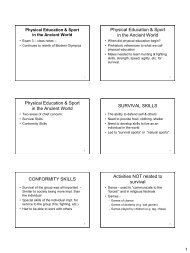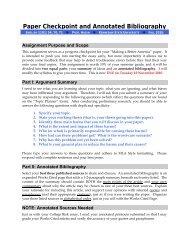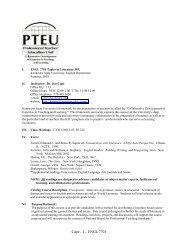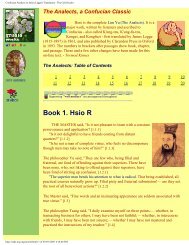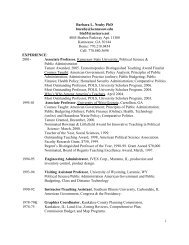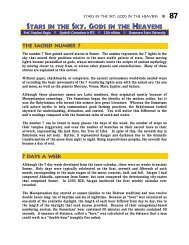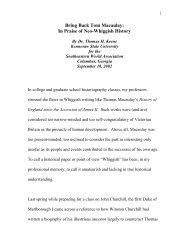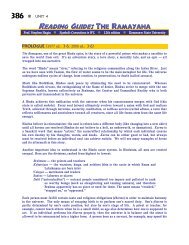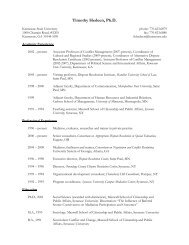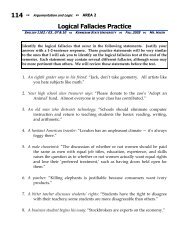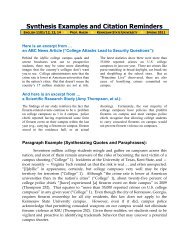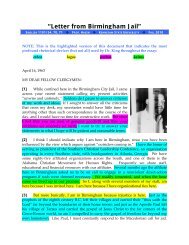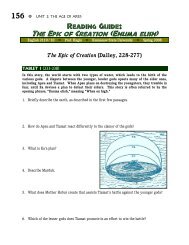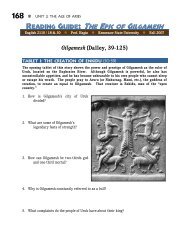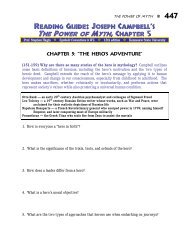Reading Guide: The Epic of Gilgamesh - KsuWeb - Kennesaw State ...
Reading Guide: The Epic of Gilgamesh - KsuWeb - Kennesaw State ...
Reading Guide: The Epic of Gilgamesh - KsuWeb - Kennesaw State ...
Create successful ePaper yourself
Turn your PDF publications into a flip-book with our unique Google optimized e-Paper software.
150 K UNIT 2<br />
same message to <strong>Gilgamesh</strong>: “<strong>The</strong>re is no permanence,” and “that which you seek you shall not find.”<br />
<strong>The</strong> holy counselors <strong>of</strong> Uruk told him this, as did the Scorpion-Men, Shamash the Sun God, Siduri (the<br />
Divine Wine Maker), Urshanabi (the ferryman), and Ut-napishtim (the wisest man). <strong>The</strong>refore, it must<br />
be true. <strong>The</strong>y explain to <strong>Gilgamesh</strong> that the gods, upon inventing eternal life, only granted that lot to<br />
themselves.<br />
We people were granted the “gift” <strong>of</strong> death. <strong>The</strong> days <strong>of</strong> life are numbered, but the days <strong>of</strong> death are<br />
not. Perhaps this forces us to recognize each day as a treasure. Each day should be filled to the<br />
fullest, with singing, dancing, and feasting (as Siduri said). Dwell more on life than on death;<br />
otherwise, your life will become death as well.<br />
When <strong>Gilgamesh</strong> arrives at Ut-napishtim’s land, he becomes the first visitor to this location. Utnapishtim’s<br />
wife looks out her window, sees a strange and haggard man approaching, and tells her<br />
husband that they have company! Once again, <strong>Gilgamesh</strong> tells his heroic tales and explains his<br />
mission. Ut-napishtim cuts him <strong>of</strong>f at one point and asks <strong>Gilgamesh</strong> why he continues to grieve,<br />
especially knowing that each day spent in sadness is one fewer happy day left in his life. He<br />
essentially tells <strong>Gilgamesh</strong> to stop using his living days to dwell on his eventual death. This is when<br />
Ut-napishtim tells <strong>Gilgamesh</strong> his story <strong>of</strong> surviving the Great Flood by heeding Ea’s commands spoken<br />
through his reed hut wall in a dream (see the Atrahasis story).<br />
Questions for <strong>The</strong> <strong>Epic</strong> <strong>of</strong> <strong>Gilgamesh</strong> (Tablet X)<br />
68. When Siduri first sees <strong>Gilgamesh</strong>, what does she mistake him as?<br />
69. After <strong>Gilgamesh</strong> identifies himself, why does Siduri not believe him?<br />
70. Why do Shamash and Siduri both tell <strong>Gilgamesh</strong>, “You will not find the eternal life that you<br />
seek”? (NOTE: this question pertains to the additional text, located on pages 149-151).<br />
71. According to Siduri, who is the only one who has ever crossed the sea to Ut-napishtim?<br />
72. When he first meets Urshanabi, why does <strong>Gilgamesh</strong> hit the ferryman on the head and<br />
smash the “things <strong>of</strong> stone”?<br />
73. How does <strong>Gilgamesh</strong> repay Urshanabi?<br />
74. What instructions does Urshanabi give to <strong>Gilgamesh</strong> to propel the magillu-boat across the<br />
lethal waters?<br />
75. What does <strong>Gilgamesh</strong> do to propel the boat once all the poles are used?<br />
76. After arriving in the land <strong>of</strong> the Far-Away, <strong>Gilgamesh</strong> tells Ut-napishtim his story. What<br />
is Ut-napishtim’s response to <strong>Gilgamesh</strong> and his quest?



